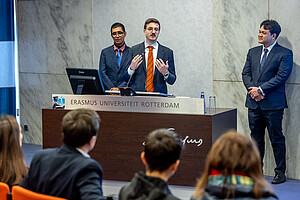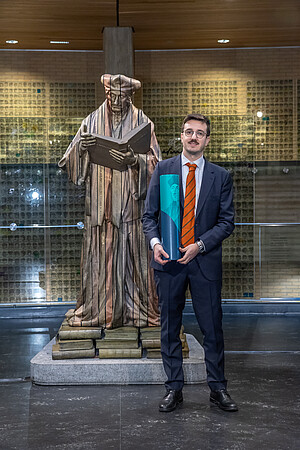PhD Defence Francesco Mazzola

In his dissertation, Externalities in Economics and Finance: Essays on Spillover Effects and Economic Decisions, ERIM’s Francesco Mazzola studied how investors, buyers, and the public sector react to economic spillovers in illiquid markets during turmoil times of financial and health crises. The dissertation suggested that individuals exposed to externalities–the impact of one party’s actions on others–often internalise these externalities in their decision-making process. For instance, when investors are forced to sell an asset within a limited time frame at fire sale prices, negative price spillovers may indirectly impair similar assets. Through his study, Francesco proposed how governments and policymakers can prevent individually rational but socially wasteful behaviour through policy interventions. As the presence and size of externalities often justify Government intervention, studying the propagation of spillover effects across market agents is a prerequisite to designing optimal policy.
Francesco defended his dissertation in the Senate Hall at Erasmus University Rotterdam (EUR) on Friday, 8 December at 10:30. His supervisors were Prof. dr. Dion Bongaerts (EUR) and Prof. dr. Wolf Wagner (EUR). Other members of the Doctoral Committee were Prof. dr. Peter Roosenboom (EUR), Dr. Anjana Rajamani (EUR), and Dr. Fabio Castiglionesi (Tilburg University).
About Francesco Mazzola

Francesco Mazzola was born in Rome, Italy. He received a BSc in Business and Economics from LUISS University and a double MSc degree in Finance from LUISS University and Nova School of Business and Economics. After graduating, he worked at the Macroprudential Policies and Financial Stability Directorate of the European Central Bank.
He joined the Department of Finance at the Rotterdam School of Management, Erasmus University, as a PhD candidate under the supervision of Prof. dr. Wolf Wagner and Prof. dr. Dion Bongaerts in September 2018. During his PhD, Francesco has held visiting research positions at Bocconi University, Boston College, and the Bank of England.
Since September 2023, Francesco has joined the Department of Finance at ESCP Business School as a tenure-track assistant professor in Finance. Francesco’s research investigates the role of financial intermediaries in the economy, with a special interest in housing markets, modern non-bank lending (e.g., FinTech), and corporate finance. His papers have been presented at top international academic conferences including the European Finance Association (EFA) meetings, the Financial Intermediation Research Society (FIRS) meetings, and the European Economic Association (EEA) conference. Francesco has also served as an ad-hoc reviewer for PLOS One, Food Policy, and the Journal of Policy Analysis and Management.
During his PhD at Rotterdam School of Management, Francesco was involved in teaching the Corporate Finance course and the Microeconomics course and supervised more than 50 Master's and Bachelor's theses.
Thesis Abstract

Investment, production, and consumption decisions of agents may affect other agents who are outside of the transaction, thereby imposing an externality on them. A person exposed to externalities often internalizes these externalities in their decision-making process. For example, when investors are forced to sell an asset within a limited time frame at fire sale prices, similar assets are indirectly impaired through negative price spillovers. Therefore, investors that would absorb more of these spillovers may have incentives to incorporate the likelihood of future externalities in their ex-ante portfolio decisions. The existence of externalities and associated economic inefficiency also makes a case for policy intervention, for example by a Government. Depending on the nature of the externality, the Government may decide to intervene to prevent individually rational, but socially wasteful behaviour, thereby generating benefits for market participants and for society. If governmental bodies have limited scope, the positive effects of a policy can even indirectly spill over to other assets or other agents not directly supervised by the authority, in which case coordination between policymakers in different jurisdictions would further increase efficiency. As the presence and size of externalities often justify Government intervention, studying the propagation of spillover effects across different market participants is an important requirement to understand optimal policy design.
View photos of Francesco's PhD Defence
Photos: Chris Gorzeman / Capital Images


